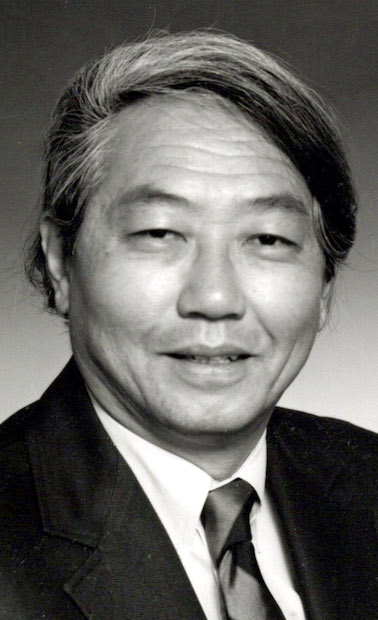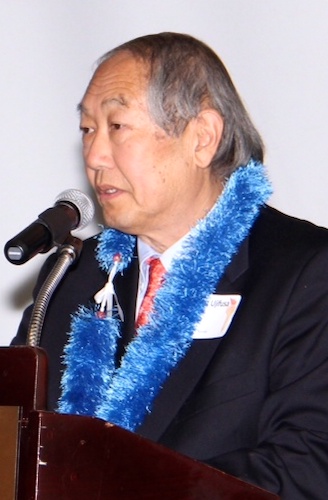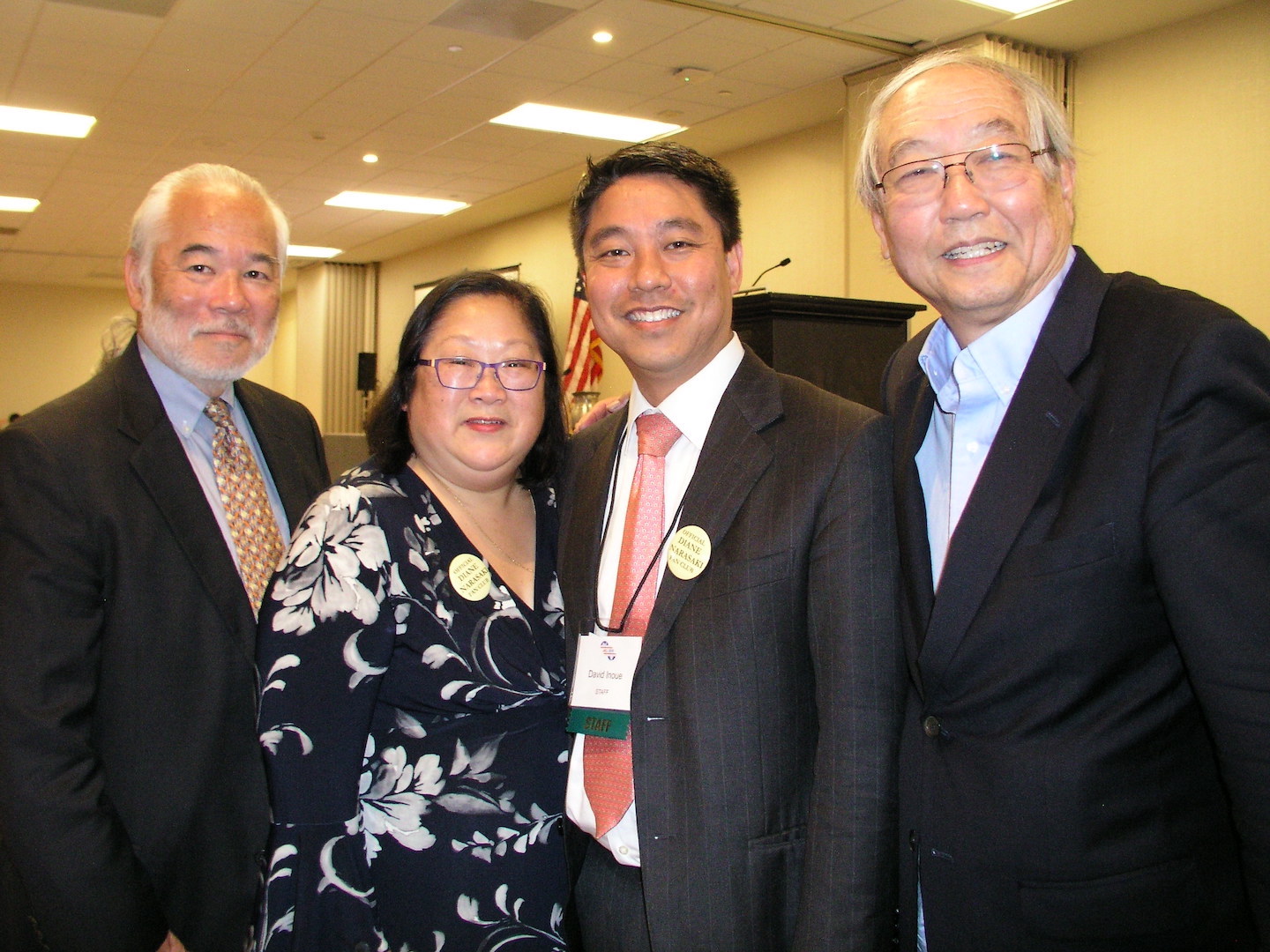Co-editor of ‘Almanac of American Politics’ helped guide redress bill to finish line.
By P.C. Staff

Grant Ujifusa
Grant Ujifusa, who served as co-editor of the “The Almanac of American Politics” and as the JACL-LEC’s legislative strategy chair helped with getting President Reagan’s signature to sign the redress bill, aka the Civil Liberties Act of 1988, died Oct. 21 in Lafayette Hill, Pa. He was 82.
A statement sent via email to Pacific Citizen from his survivors reads: “Grant Ujifusa’s family has always been deeply honored and blessed by his connection to and work on behalf of Japanese Americans. His dedication to redress and pride in his Japanese ancestry and family were matched by his friends and relationships in the Japanese American community.
“He lived a full professional and family life, and he was a one-of-a-kind character. Perhaps his favorite expression was one he learned from a Buddhist priest that served his family when he was a child: ‘Where there is gratitude, there is civilization.’ ”
A Sansei, Ujifusa was born to Mary (Okugawa) and Tom Ujifusa on Jan. 4, 1942, in Worland, Wyo. — about 90 miles from the Heart Mountain War Relocation Authority Center — where his parents farmed sugar beets. Thus, neither his family nor he experienced the mass removal and incarceration of Japanese Americans from the West Coast encountered from President Roosevelt’s Executive Order 9066.
A 1965 graduate of Harvard University, which he attended on a scholarship, Ujifusa also earned a master’s degree from Brandeis University and studied at Brown University. Early in his career, he worked in publishing for Gambit, Houghton Mifflin, Random House and Macmillan. He also worked for Reader’s Digest.
“I think it was the most important and most intense thing I ever did in my life. … I never went at anything with as much intensity and feeling as this.”
— Grant Ujifusa on his involvement in the redress movement
In 1972, Ujifusa and Michael Barone co-founded “The Almanac of American Politics,” which became an essential go-to resource not only for Washington, D.C. watchers, insiders, journalists and policy wonks but for politicians themselves. As a result, his association with this tome gave him an outsize influence in political circles and an inside track to the goings-on within Congress and the federal government.
It was for this reason, as Ujifusa noted in an oral history recorded by Densho, that he was approached by JACL heavyweights Mike Masaoka and Minoru Yasui to help with navigating the labyrinth of Washington, D.C. politics to get the redress drive from Quixotic quest to real-world redemption that would end up on the desk of President Reagan, which he enacted on Aug. 10, 1988.

Grant Ujisusa addresses the audience at the Sept. 21, 2013 JACL PSWD Awards Luncheon. (Photo: Douglas Urata)
But it was also the emotional reaction Ujifusa had to witnessing a hearing of the Commission on Wartime Relocation and Internment of Civilians that compelled him to lend his expertise to the redress movement, despite having no relatives who were incarcerated by the federal government.
According to the Densho oral history, Ujifusa related how he had attended the one-day hearing of the New York leg of the CWRIC’s multicity hearings. “I stayed for the whole day. I took the day off from work. And like a lot of people there, I was crying.”
Ujifusa added: “The total impact of the, of the emotional impact of the Commission hearings in New York I think convinced me.” But he also recalled how his mother, who grew up in Colorado, had a parallel experience.
From Densho: “She worked very hard in high school in La Junta, Colorado. She earned valedictorian, valedictorian honors. And the kids liked her, the kids in her class liked her. But the teachers and the administration and the school board announced that, ‘There would be no Jap speaking at graduation this year and, and we have a Jap valedictorian, so we’re not going to have any speeches.’ And that, that I remembered and it hurt Mom. Mom didn’t get a chance to go on to college. This meant a lot to her, and she was denied that.”
Regarding his participation in the redress movement and its success, Ujifusa also told Densho: “I think it was the most important and most intense thing I ever did in my life. … I never went at anything with as much intensity and feeling as this.”
In 2012, the government of Japan bestowed its Order of the Rising Sun, Gold and Silver Rays to Ujifusa in recognition of his work on redress.

Stuart Ishimaru, Karen Narasaki, David Inoue and Grant Ujifusa after the July 2018 plenary marking the 30th anniversary of redress. (Photo: George Toshio Johnston)
In 2022, Ujifusa donated seed money to launch the Harry K. Honda Memorial Journalism Fund to help the Pacific Citizen and named to honor the decades-long work of former its former editor, Harry Honda. His donation was intended to help the newspaper pay current and new contributing writers and freelancers and help defray general operational expenses incurred by the P.C. and its mission to produce in-depth feature stories and content that relates directly to the nation’s Japanese American and Asian American communities.
For most of his career in publishing and investing, he and his wife lived in Chappaqua, N.Y., but had recently moved to the Philadelphia suburbs to be close to his grandchildren.
Ujifusa is survived by his wife, Amy Brooks Ujifusa, their sons Steven Ujifusa (Alexandra Vinograd), Andrew Ujifusa (Jennifer) and John; and two grandsons (Isaac and Max); and sister, Susan Diamond.
Donations can be made in Ujifusa’s memory to the Asia Society at tinyurl.com/58metc6y. To donate to the Harry K. Honda Memorial Journalism Fund in Ujifusa’s memory, send an email to busmgr@pacificcitizen.org.
JACLers Remember Grant Ujifusa
I was saddened to hear of a long-time and influential JACL friend, Grant Ujifusa’s passing. He was most well-known for being instrumental in directing the Legislative Education Committee as its chief strategist. Through his work as the editor of “The Almanac of American Politics,” his personal relationships and intimate knowledge of the hierarchies in all the legislators’ offices proved to be very helpful in identifying the staff members of the members of Congress most in need of convincing to support the Redress legislation. This tactic was most helpful for Grayce Uyehara to engage those who had the most influence in each of the offices. Grant was one of the many folks whose personal involvement contributed to the eventual success of Redress. My sincere condolences to the family.
— Larry Oda, JACL national president
I first came to know of Grant Ujifusa as editor of “The Almanac of American Politics.” As I was looking to move to Washington, D.C., to work in health policy and in my early years of legislative advocacy work, the “Almanac” was the ultimate guidebook to navigating congressional offices. When I first met Grant, many years later, it was a great fanboy moment. And now I have also come to appreciate the role he played in the redress movement and as a longtime JACL supporter. He will be missed by so many here in Washington, D.C., and in our community.
— David Inoue, JACL executive director
I will always remember Grant, who was a relatively younger leader in LEC, for his ongoing efforts to ensure that JACL remember and credit the older or departed LEC leaders — including my mother — for their contribution to the success of the redress campaign. Now that he has passed, we similarly need to remember his singular contribution to devising and guiding the successful redress lobbying effort.
— Paul Uyehara, EDC governor
I had the honor of observing Grant Ujifusa as he served as the chief legislative strategist for the Legislative Education Committee (LEC — a separate legal entity, but significant partner of the Japanese American Citizens League ) as the Japanese American community sought redress and reparations from the United States for the illegal imprisonment of over 25,000 Americans of Japanese ancestry in the period following the outbreak of World War II. Grant, along with LEC lobbyist, Grace Uyehara were instrumental in the eventual passage of the Redress legislation. The entire Japanese American community is and will always be indebted to Grant and Grace for their contributions to the redress movement. I join the rest of the JACL community in offering our sincere condolences to the Ujifusa family for their loss.
— Ken Inouye, former JACL national president
Grant Ujifusa was always among the most intense about redress. He never stopped. I hope he finds peace. Gassho.
— Ron Wakabayashi, JACL national director during redress
The redress campaign was a 10-year battle fought across the social and political landscape of America, a battle spearheaded by the JACL but involving many people and groups. Among the many individuals who deserve recognition for their contributions to that effort, it goes without saying that Grant’s contributions as the LEC strategist were vital and important in leading to the final outcome of the Civil Liberties Act. His involvement in the campaign was relatively short, but in those two or three years, he left his mark.
— John Tateishi, chair of the JACL’s National Committee for Redress (1978), former JACL national director, national redress director, former principal redress lobbyist



